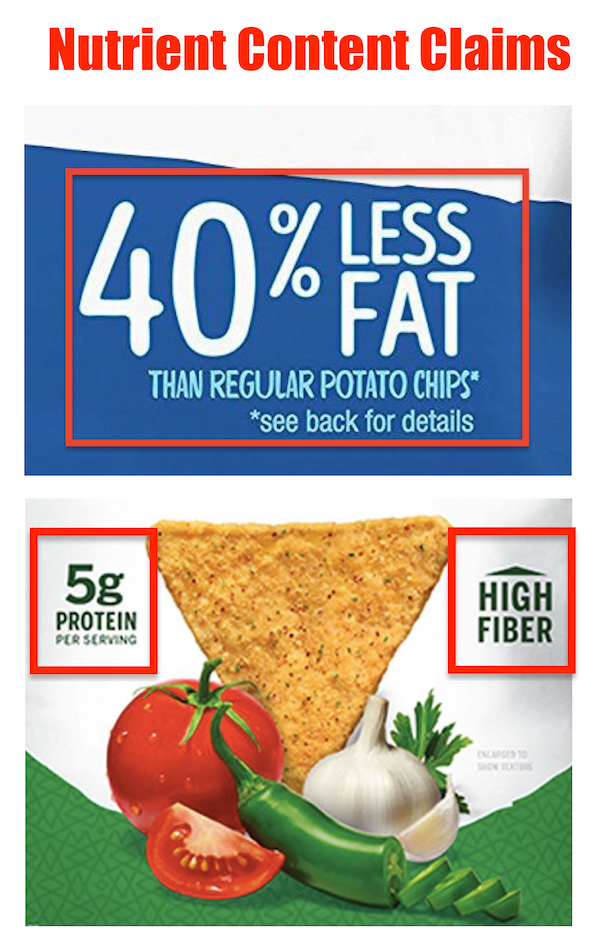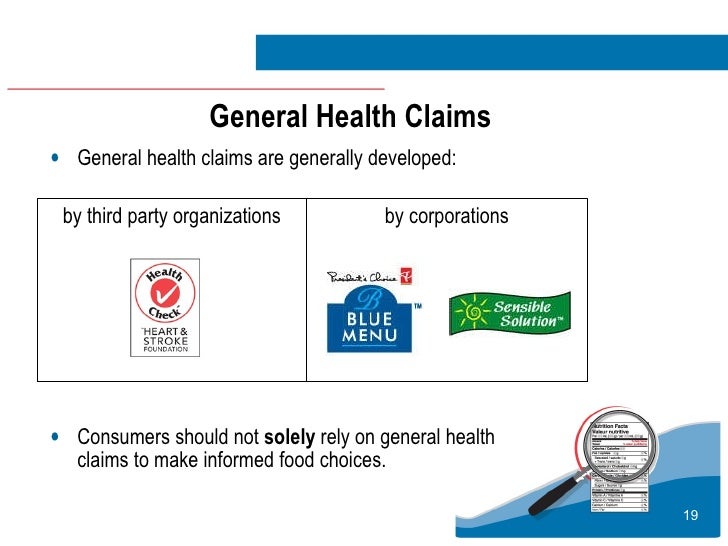40 health claims on food labels australia
HEALTH CLAIMS ON FOOD - Public Health Association of Australia Inc claims on food products was introduced in Australia and New Zealand, in accordance with the fundamental nutrition principle that it is the total dietary balance that is important for health, and not individual foods claiming special medical benefits. 2. This prohibition policy has effectively prevented many What Are The Labelling and Packaging Laws in Australia? As a general rule, all product packaging and labels must comply with the Australian Consumer Law (ACL). The ACL prohibits you from making misleading, deceptive, or false claims on your products. You must also ensure that your product labels comply with any specific laws that apply in your industry, such as the food standards code.
About food labels | Health and wellbeing - Queensland It covers: Country of origin labelling. Fish labelling. GM food labelling. Health advisory labels on alcoholic beverages. Health claims (nutrition, health and related claims) Ingredient lists and percentage labelling. Labelling for religious, environmental, animal welfare and other consumer value issues.

Health claims on food labels australia
Labelling Guidance - Australian Beverages Standard 1.2.7 sets out the rules for food businesses choosing to make nutrition content claims and health claims. Nutrition content claims are claims about the content of certain nutrients or substances in a food or beverage, such as 'low in fat' or 'good source of calcium'. These claims will need to meet certain criteria set out in the Standard. Organic claims | ACCC Organic products intended for the Australian market are not required to be certified in order to be labelled 'organic'. However, there is a voluntary standard for growers and manufacturers wishing to label products as 'organic' and 'biodynamic' for sale within Australia (AS 6000-2015). Nutrition, health and related claims - Food Standards Health claims You can only base health claims on food-health relationships that have been substantiated according to Standard 1.2.7. All health claims must be supported by scientific evidence to the same degree of certainty, whether they are pre-approved by us or self-substantiated by food businesses. General level health claims
Health claims on food labels australia. Food labels - Better Health Channel Health claims can also be made about a food product and relate to a nutrient or substance in a food, and its effect on health. There are 2 types of health claims: General level health claims - demonstrate the effect on a health function due to a nutrient or substance that is present in a food, such as 'calcium is good for bones'. In Pictures: 29 Foods With "Health Claims" That Are Deceiving You And ... Foods With Health Claims: The Surprising Ways That Food Companies Try to Trick You. I casually walked through every aisle of the grocery store and picked out things with labels that could be considered misleading, or otherwise made you think the product is healthy. Things that children or uninformed people might fall for. The first one? Snapple. Health-related claims on food labels in Australia: understanding ... Abstract Objective: Health and related claims on food labels can support consumer education initiatives that encourage purchase of healthier foods. A new food Standard on Nutrition, Health and Related Claims became law in January 2013. Implementation will need careful monitoring and enforcement to ensure that claims are truthful and have meaning. (PDF) Regulating health claims on food labels using ... - ResearchGate Objective: Proposed Australian regulation of claims on food labels includes requirements for products carrying a health claim to meet nutrient profiling criteria. This would not apply to nutrition ...
Australia New Zealand Food Standards Code - Legislation This Standard is Australia New Zealand Food Standards Code - Standard 1.2.7 - Nutrition, health and related claims. This Standard commences on 1 March 2016, being the date specified as the commencement date in notices in the Gazette and the New Zealand Gazette under section 92 of the Food Standards Australia New Zealand Act 1991 (Cth). Health, nutrition and credence claims - food marketing and ... - Lexology The new Standard 1.2.7 - Nutrition, Health and Related Claims regulates the voluntary nutrition and health content claims that food businesses can make on labels and in advertising. The goal of ... Advertising Compliance and Food Packaging - LegalVision A health claim is one that states, suggests or implies that a food product or a certain property of the food product has, or may have, a health effect. Additionally, businesses can make health claims in their advertising, provided they comply with Commonwealth and state Food Standards legislation, and the claims are true. Nutrition content and health claims | Obesity Evidence Hub Australia's Food Standards Code sets out requirements for manufacturers wishing to make nutrient content claims ('low in fat') and health claims ('nuts contribute to heart health') on food labels. Fair trading laws in Australia also require that food labels do not misinform consumers through false, misleading or deceptive representations.
How to read food labels | healthdirect In Australia, the law requires all manufactured foods to carry labels containing safety and nutrition information. This information helps you to make decisions about the food you buy and eat so you can follow a healthy diet. The label will tell you: the name of the product, describing accurately what it is the brand name Health & nutrition claims | NSW Food Authority The Food Standard Code contains 200 pre-approved food-health relationships that any health claim must comply with. From January 2016, food businesses must comply with criteria set out in Standard 1.2.7 (Nutrition, health and related claims) for food labels and advertisements. Health and nutrition claims | NSW Food Authority Health and nutrition content claims are voluntary statements made by food businesses on labels and in advertising about the health benefits of the food and need to meet the criteria set out in the Food Standards Code. Health claims refer to a relationship between a food and health. Health-related claims on food labels in Australia ... - Europe PMC Health and related claims on food labels can support consumer education initiatives that encourage purchase of healthier foods. A new food Standard on Nutrition, Health and Related Claims became law in January 2013. Implementation will need careful monitoring and enforcement to ensure that claims are truthful and have meaning.
Health-related claims on food labels in Australia: understanding ... Abstract Objective Health and related claims on food labels can support consumer education initiatives that encourage purchase of healthier foods. A new food Standard on Nutrition, Health and Related Claims became law in January 2013. Implementation will need careful monitoring and enforcement to ensure that claims are truthful and have meaning.
How effective is food industry self-substantiation of food-health ... The Food Standards Code regulates health claims on Australian food labels. General-level health claims highlight food-health relationships, e.g. 'contains calcium for strong bones'. Food companies making claims must notify Food Standards Australia New Zealand (FSANZ) and certify that a systematic literature review (SLR) substantiating the ...
'I AM the Burger King': McDonald's chef devours every sandwich (6,000 calories worth) from rival ...
How to understand food labels | Eat For Health Sometimes labels will include nutrition content claims like 'low fat', 'reduced salt' or 'high fibre'. These claims can only be used if the food meets certain criteria. For example, with a 'good source of calcium' claim, the food must contain more than a set amount of calcium.
Regulating health claims on food labels using nutrient ... - Cambridge Core In Australia, nutrition information that may appear on food labels includes the mandatory nutrition information panel, as well as optional health claims and nutrition content claims. Nutrition content claims are defined as statements about the presence or absence of a particular nutrient, such as 'source of calcium' ( 2 ) .
Food and medicine regulation - Therapeutic Goods Administration (TGA) In 2013, a Food Standard (Standard 1.2.7) that sets out rules for the use of nutrition content and health claims on food labels and advertisements became law. It's swallowed and makes health claims - so is it a medicine or food? Generally a product that is swallowed will be either one form of therapeutic good (a medicine) or a food.
Food labelling - Health.vic Food labels are required by law to carry essential information so that consumers are informed of the nature and properties of foods prior to purchase -- this includes statements about the presence of allergenic ingredients that could lead to life-threatening allergic reactions in susceptible persons if the labelling information is not accurate.
PDF Getting Your Claims Right - Food Regulation All food businesses, including importers, in Australia and New Zealand must comply with Standard 1.2.7 when making nutrition content claims and health claims on food labels, in advertisements and in endorsements on food. The diagram on page 4 can help you consider whether Standard 1.2.7 applies to any claims made.
Label Claims for Food & Dietary Supplements | FDA Among the claims that can be used on food and dietary supplement labels are three categories of claims that are defined by statute and/or FDA regulations: health claims, nutrient content claims,...
Regulating health claims on food labels using nutrient ... - PubMed Regulating health claims on food labels using nutrient profiling: what will the proposed standard mean in the Australian supermarket? The number of products carrying nutrition content claims that did not meet the nutrient profiling criteria suggests that comprehensive regulation is warranted.
Do Health Claims and Front-of-Pack Labels Lead to a Positivity Bias in ... Health claims and front-of-pack labels (FoPLs) may lead consumers to hold more positive attitudes and show a greater willingness to buy food products, regardless of their actual healthiness. A potential negative consequence of this positivity bias is.
CHOICE guide to food labelling - Nutrition Nutrition content claims and health claims. In 2013, a new standard was introduced to regulate nutrient claims and health claims on food labels. Nutrition content claims are claims about the content of certain nutrients or substances in a food, such as 'low in fat' or 'good source of calcium'. These claims will need to meet certain ...
Nutrition, health and related claims - Food Standards Health claims You can only base health claims on food-health relationships that have been substantiated according to Standard 1.2.7. All health claims must be supported by scientific evidence to the same degree of certainty, whether they are pre-approved by us or self-substantiated by food businesses. General level health claims
Organic claims | ACCC Organic products intended for the Australian market are not required to be certified in order to be labelled 'organic'. However, there is a voluntary standard for growers and manufacturers wishing to label products as 'organic' and 'biodynamic' for sale within Australia (AS 6000-2015).
Labelling Guidance - Australian Beverages Standard 1.2.7 sets out the rules for food businesses choosing to make nutrition content claims and health claims. Nutrition content claims are claims about the content of certain nutrients or substances in a food or beverage, such as 'low in fat' or 'good source of calcium'. These claims will need to meet certain criteria set out in the Standard.














Post a Comment for "40 health claims on food labels australia"